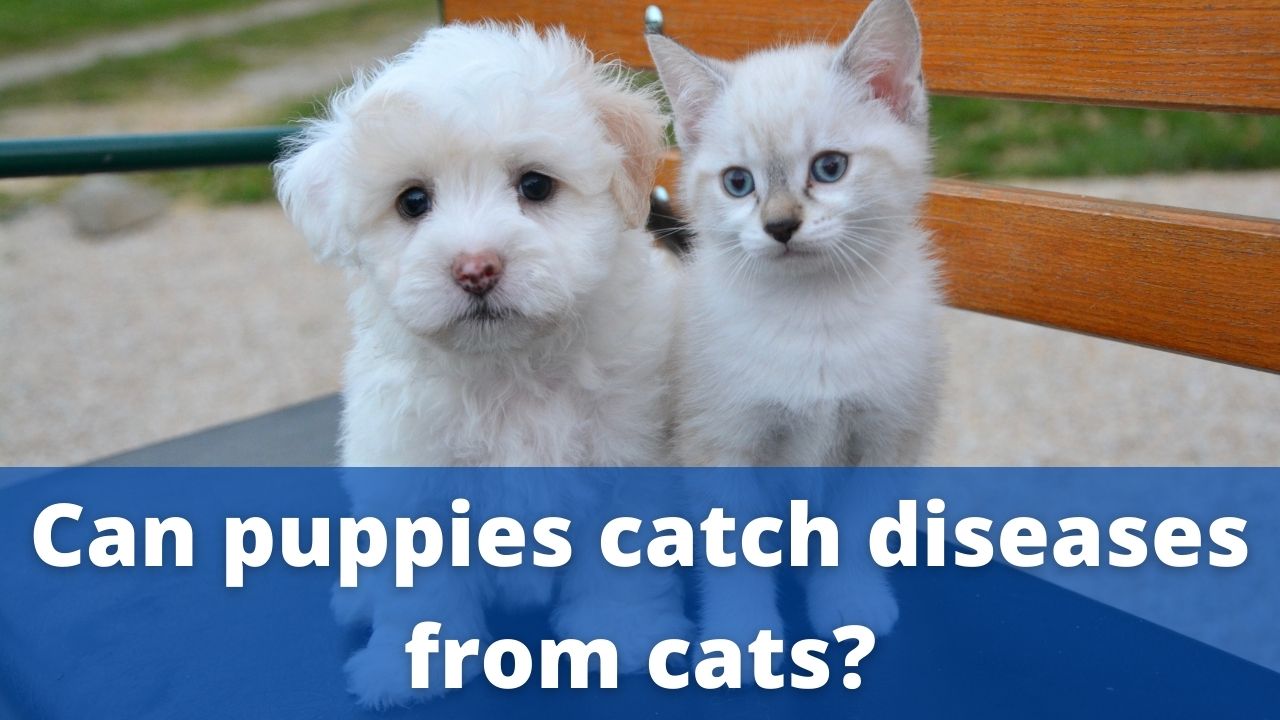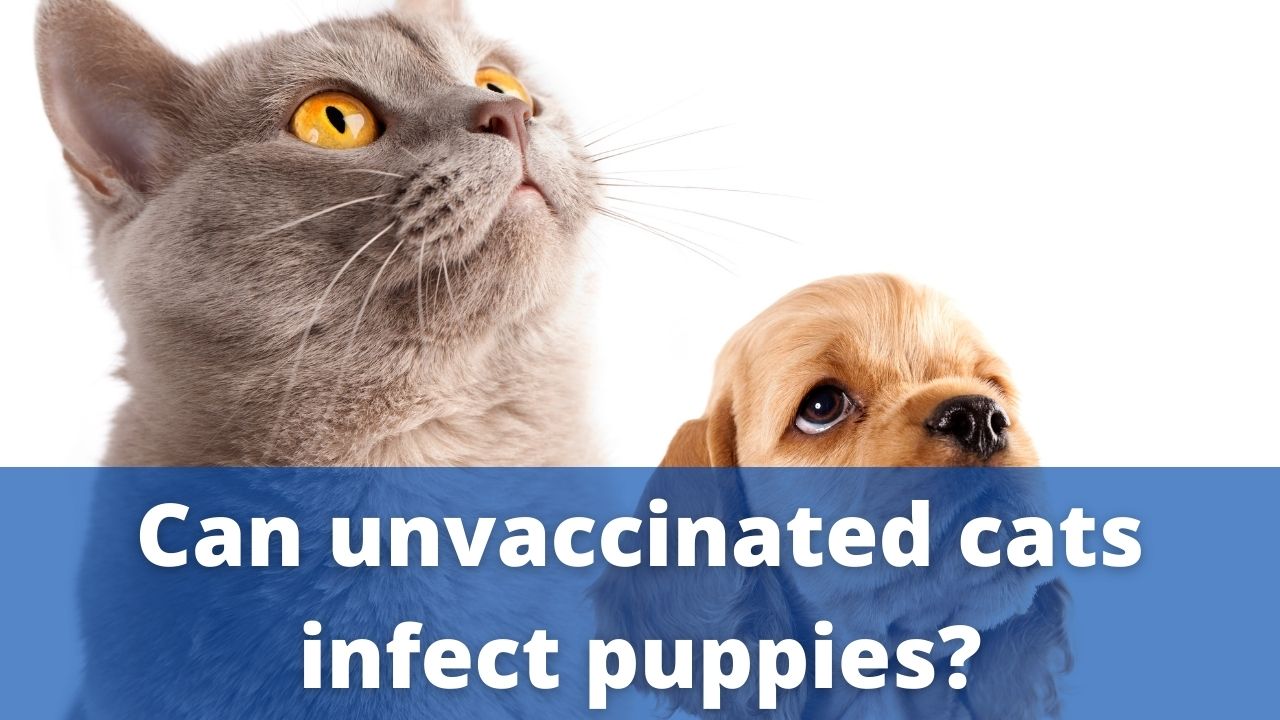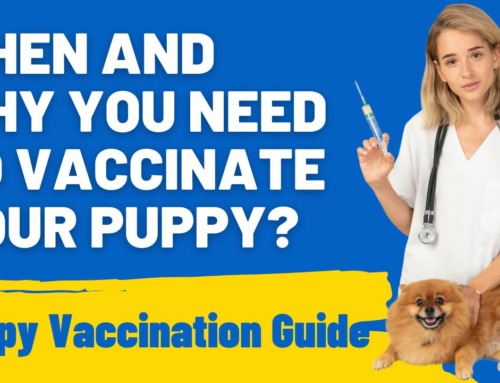Cats and dogs are very different animals. They have different needs, develop differently, and mostly suffer from different illnesses. However, some health conditions can transfer between the two species, and we must be vigilant about transmissible diseases which can occur between an unvaccinated puppy and a cat.
Is it safe for a puppy to be around cats before they’re vaccinated?
Unvaccinated puppies can generally be around cats, so long as the cats in question are up to date on their vaccinations, tick and flea treatments, and deworming. For the most part, cats and dogs get vaccinated against different diseases and species-specific infections.
For instance, there are different feline and canine strains of viruses like parvo and distemper, and so they should not be able to infect one another, even if the cat is sick.
That said, there is always an inherent risk in exposing unvaccinated animals to each other, regardless of species. Cats can still pass several fatal diseases to a puppy that has an undeveloped immune system, such as rabies in extreme cases.
Regardless of vaccines, cats can also pass on other issues, such as tick and flea-borne problems, or other health issues such as ringworm or mange.
As a rule of thumb, if possible, it’s best not to take any risks and keep your puppy away from cats until they have had their shots and have an overall clean bill of health.
You may also want to read: Puppy Vaccinations: When Can They Go Outside?
Let’s run through a couple of scenarios to answer the question more specific to your puppy…
Is the cat in question your own cat? Do they have their vaccinations up to date and are treated for fleas and ticks? If this is the case, then your puppy will be unlikely to catch anything nasty from your cat. If your cat is an indoor cat then even better.
If the cat in question is someone else’s cat, and you don’t know if they are vaccinated or have had flea and tick treatment, then it’s best to keep your puppy away from that cat, at least until your puppy has had their vaccinations and treatments.

Can puppies catch diseases from cats?
There are many diseases your puppy could potentially catch from cats. Luckily, when both are vaccinated, the risks are much lower.
Nevertheless, there are infections, fungi, viruses, and bacteria that cats can transmit to dogs (and humans too).
Here is more information on each one:
Transmissible Fungal Infections
Some of the potential infections are relatively harmless if treated early. For example, ringworm is a fungal infection that is very good at crossing the species barrier. Therefore, one can treat it with a simple antifungal cream.
If left untreated, ringworm can become a more serious problem. As your puppy scratches at the affected skin, they can scratch the affected area open, creating an ideal environment for more serious bacterial infections.
Parasites between cats and dogs
Parasitic infections can be more serious, especially if they go undetected. Many parasites jump from cats to puppies with no effort at all. These include hookworm, tapeworm, roundworm, and external parasites such as fleas and ticks.
Parasites feed off your pet, either directly or by robbing your puppy of nutrients during digestion. Most parasites are treatable with relative ease, but there’s a risk that they go undetected until the situation is pretty serious.
By robbing your puppy of important nutrients, these parasites can negatively impact their development.
Parvovirus between cats and dogs
Parvovirus, or parvo, is a serious and life-threatening disease found in many predatory species. In general, parvovirus is considered species-specific. So, cats have cat-parvo, and dogs have dog parvo. They are FPV and CPV, respectively.
However, there are reasons to believe that things are not quite that simple.
We are all more familiar with virus mutations these days, but these mutations are not exclusive to respiratory diseases.
Some animals, like raccoons, are susceptible to both the feline and canine parvovirus variants. Therefore, areas that have dogs, cats, and raccoons, are the perfect environment for mutations to occur that may be able to cross the barrier between the cat and dog species.
One study found that a civet cat contracted canine parvovirus. The study draws particular attention to how this seems to be a transmission directly from domestic dogs to wild cats.
Their testing proved beyond a shadow of a doubt that the cat contracted the canine parvovirus variant, albeit one that had undergone minor mutations. The study shows the potential for parvoviruses to cross the species barrier with only minor mutations.
Furthermore, this study, and others like it, suggest that parvovirus variants can be transmitted back from wild animals to domestic animals. In the case of the civet cat, the mutated canine parvovirus could infect domestic cats.
The biggest challenge to knowing for certain is this: most animals that contract the virus don’t get tested for which variant they have. So you would have to run a PCR test to determine whether it is the canine variant or the feline variant.
Unfortunately, such testing is costly. Therefore the only animals frequently tested for the variant are zoo animals and livestock.
That leaves room for more study of the variants affecting raccoons, rabbits, coyotes, etc., previously thought of as species-specific, and their potential zoonotic overflow or interspecies infection.
In short, while it is largely thought that cats and dogs can’t infect each other with parvo, mutations can form, especially if there is a third animal in the area that is susceptible to the disease. This may become a bigger issue in the future, and underlines the importance of vaccinating your animals.
Here is a complete list of where puppies can catch Parvo.
Rabies in cats and dogs
We tend to think of rabies as a rare condition that only affects wild animals. But, unfortunately, that means we overlook that rabies is arguably the single most dangerous virus on earth.
The fearsome Ebola virus has a staggering mortality rate of 50%, meaning half of all infected people die from it. Things might have been different if we had a way to neutralize the virus before symptoms set in.
Fortunately, we have exactly that for rabies, a way to neutralize the virus before symptoms set in. But, unfortunately, once symptoms start, rabies has a 100% fatality rate. Except for two human cases, every case of rabies ever recorded has been fatal.
If that were not bad enough, the species-barrier between cats and dogs poses no challenge to this terrifying virus. But, unfortunately, that means that it can pass from your cat to your dog to a wild animal to you.
Rabies also has a 99% infection rate when exposed to it via bites. When you consider all of that, it is easy to understand why many health organizations categorize it amongst the most deadly diseases on earth, with some outright handing it the title of the most deadly virus known to humankind.
Even though incidents of rabies are lower than most other diseases your puppy might encounter, their life may depend on vaccination against rabies.
Mange between cats and dogs
Mange, or scabies, is not so much a disease as an infestation. Sarcoptes mites are to blame and cause moderate to severe skin conditions, including itching, loss of fur, yellow crust on the skin, and various subsequent skin infections.
Mostly, the mites that cause mange are species-specific, meaning that dogs have their variant, as do cats, cattle, and even rabbits. Hence, mites won’t jump from your cat to your puppy.
Studies have found evidence of interspecies transmission of the mites responsible for mange. The species barrier might not be a real barrier as much as a preference for these mites, but that requires further study.
The short of it is that there is evidence that suggests that one species, such as a cat, can transmit mites to another species, like a dog. Although this is not a virus and there is no vaccine for it, it is worth being aware of.

Can unvaccinated cats infect puppies?
We’ve discussed the risks of allowing your pup to be in contact with a vaccinated cat, but what about unvaccinated cats? Why are the risks higher?
As we have seen, some zoonotic viruses or viruses can cross the species barrier. A small number of these viruses can pass between cats and dogs. However, an unvaccinated cat is a bigger risk because they, themself, are at a greater risk of contracting such viruses.
Can puppies get parvo from cats?
Yes, however, it is uncommon and unlikely. More research needs to investigate the possibility of cross-species infections amongst both wild and domestic animals. Isolated studies in recent years have yielded conclusive evidence that the variants can cross the species barrier with only minor mutations.
Can unvaccinated puppies be around other animals?
Unvaccinated puppies should have extremely limited interaction with other animals, especially those that are not vaccinated. Of course, the risks are greatest when the other animals in question are also unvaccinated, however even vaccinated animals can be a problem.
In zoonotic spillover, many viruses can cross the species barrier. Some, like SARS-Cov-19, can even be transmitted from humans to animals and then from one species of animal to another.
Remember, a puppy’s immune system is not properly developed until they are around six months old. This makes them vulnerable to any disease or virus that can jump from contact with other dogs, such as distemper, or be transmitted by feces contamination, such as parvo.
In the case of parvo, infection can happen as easily as a bird stepping in the poop of an infected dog at one spot, and then landing on your lawn and bringing the virus with them. A run-in with a wild animal can be just as problematic, as puppies can get a range of diseases from them, too.
However, the biggest danger to unvaccinated puppies is other canines, as viruses like distemper, dog flu, or parvo are usually passed directly between them.
Final word
Unvaccinated puppies are at a higher risk of contracting serious and even life-threatening conditions from other animals, including cats. Conversely, interactions with vaccinated animals are less risky but still pose some threats.
The major takeaway is to always ensure your puppy’s vaccines are up to date and be mindful of the animals with which they interact. Prevention is always better than cure.
Sources
Disease risks for dogs in social settings | American Veterinary Medical Association (avma.org)
Frequent Cross-Species Transmission of Parvoviruses among Diverse Carnivore Hosts (nih.gov)




